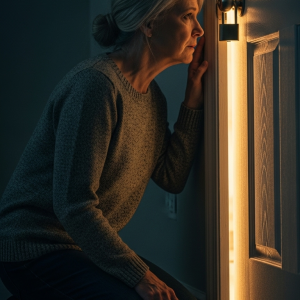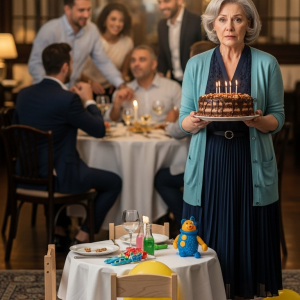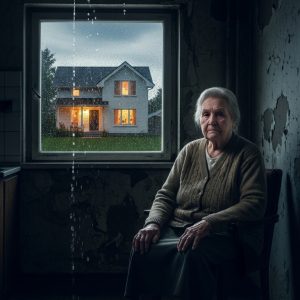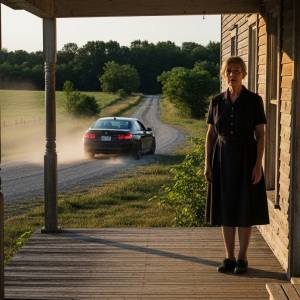The invitation arrived on a Tuesday. Cream-colored card stock with gold embossing that probably cost more per piece than I spent on groceries in a week. Mr. and Mrs. Ryan Richardson request the honor of your presence. I had to read it twice before I realized my son was getting married and I was being informed, not consulted.
No phone call, no visit. Just a formal announcement in the mail, as if I were a distant relative they felt obligated to include. I set it on my kitchen counter next to the stack of past-due notices and stared. Ryan was 28, a success in his tech job, living in a downtown loft I could never afford. He’d been with Barbara for three years, and I’d met her exactly twice—brief, awkward encounters where she looked at my small apartment with the polite disgust wealthy people perfect.
I called him that evening. “Oh, hey, Mom.” His voice had that distracted quality it always carried when he talked to me, like he was simultaneously scrolling through his phone. “You got the invitation.”
“I did. Congratulations, honey. When would be a good time to help with the planning? I know these things can be expensive, and I’ve been saving…”
“Mom, stop,” his voice sharpened. “We don’t need your help. Barbara’s parents are handling everything. It’s all taken care of.”
“I’m not talking about money, Ryan. I’m talking about being involved. A mother-son dance, helping choose flowers…”
“We’ve already done all that,” he cut in. “Look, just show up on the day, okay? Wear something nice, but not too… you know. Barbara’s family is pretty traditional.”
Something nice, but not too me. I understood perfectly. “Of course,” I said, my voice steady despite the familiar ache spreading through my chest. “I wouldn’t want to embarrass anyone.”
“It’s not about—never mind. I have to go.” The line went dead. In small print, the invitation said, Black tie optional. Over the next three months, I saved every penny. By May, I had enough for a deep emerald green dress, simple but elegant. I wanted, just for one day, to look like I belonged.
The morning of the wedding, I stood before my mirror and barely recognized myself. The woman staring back looked polished, dignified. For a moment, I let myself imagine Ryan’s face when he saw me, maybe with a flicker of pride.
The country club sat on perfectly manicured grounds. Inside, the lobby gleamed with marble and crystal. I spotted Ryan near the main staircase, resplendent in his tuxedo. As I approached, his gaze found mine, and his smile faltered. Not with warmth, but with something that looked like resignation.
“Mom,” he said, his voice carefully neutral. “You made it.”
“You look so handsome,” I said, reaching up to straighten his bow tie, a gesture I’d done a thousand times. He stepped back slightly, just enough to break the contact. “Thanks. You look… nice.” The pause before nice lasted just long enough to sting.
The ceremony was beautiful. I sat in the third row, behind Barbara’s extended family. No one saved me a seat in the front. No one seemed to notice I was there at all.
The reception hall was a vision of understated elegance. I found my name card at Table 7, tucked in the back corner near the kitchen doors. At Table 1, directly in front of the head table, were the Whitmores, Barbara’s parents. I understood exactly where I ranked in my son’s new world.
“Excuse me, are you Ryan’s mother?” The voice belonged to a woman with kind eyes. “I’m Margaret, Barbara’s great-aunt. I was hoping to sit with someone who knows the groom.”
“Catherine,” I replied, grateful for a friendly face. “Please, join me.”
The cocktail hour stretched on. I watched my son work the room, moving from table to table, shaking hands, sharing laughs. He visited every table except mine. When dinner was finally served, the staff moved with practiced efficiency. Tables 1 through 6 received their meals—beautifully plated, steaming salmon. By the time they reached our table, the kitchen was running behind, and then they ran out of plates.
“I’m so sorry,” the server said, genuinely embarrassed. “There was a miscommunication. Your meals will be out in just a few minutes.”
Thirty minutes passed. Around us, other guests had finished eating. Finally, a different server appeared with my plate. The salmon was cold, the asparagus limp. “Kitchen scraps,” Margaret whispered sympathetically. I smiled and picked up my fork. I was used to leftovers.
I was halfway through my cold meal when I heard it—Ryan’s voice carrying across the room. He was talking to Barbara, but just loud enough for the nearby tables to hear.
“Did you see they finally brought my mom her food?” He gestured toward my table with a grin that looked cruel in the soft lighting. “She’s used to eating what life leaves behind, so she won’t mind.”
Barbara laughed, a tinkling sound like breaking glass. Several people at the head table joined in. The sound rippled outward as his college friends picked up on the joke. I set down my fork carefully, my hands steady despite the earthquake inside my chest.
Ryan continued his speech, thanking everyone. He thanked the caterers, the musicians, even the florists. He never mentioned me. As the applause thundered, I sat in my corner and felt something inside me break cleanly in two. Not shatter—that would have been messy. This was precise, surgical. The final severance.
The dancing began. The father-daughter dance, the mother-son dance with Barbara’s mother. I waited for Ryan to find me, but the invitation never came. He was too busy, too important, too caught up in his new life to remember the woman who had worked double shifts to pay for his baseball equipment.
I stood up, retrieved my purse, and headed for the exit. No one noticed me leaving. I drove home in complete silence. The woman who had entered that country club hopeful and nervous was gone. In her place sat someone I was just beginning to meet.
At my kitchen table, I began to compose the most important email of my life. I wrote it not with anger, but with the precision of someone who had finally stopped pretending that love could exist without respect.
Ryan, I’m writing this while your wedding day is still fresh in my memory. I want to thank you for the clarity you provided tonight. Your comment about me being used to ‘eating what life leaves behind’ was illuminating. For the first time in years, you told me exactly what you think of me.
You’re right. I have spent most of my adult life accepting leftovers. But tonight, watching you laugh while I sat with my cold dinner, I realized something important: I taught you to treat me this way.
Effective immediately, I am withdrawing all financial support. This includes the $500 monthly deposits to your savings account. There is no trust fund, Ryan. It was me, working overtime so you could build your nest egg. I am also discontinuing the life insurance policy that names you as beneficiary and canceling the emergency credit card you’ve used repeatedly with promises to pay me back that never materialized.
Most importantly, I am selling the house. Yes, I own the house where you grew up. I never told you because I wanted you to succeed on your own merits. It is worth approximately $340,000. I will be using that money to travel, to live, to finally experience the things I postponed while being invisible in your life.
I’m not angry. Anger implies I expected better. Instead, I’m grateful. You’ve freed me from the exhausting work of trying to earn your love. Don’t mistake this for a threat. I’m not looking for an apology. I am simply informing you that the Bank of Mom is permanently closed. You will always be my son, but I will no longer be your safety net.
Catherine
At 3:47 a.m., I clicked send. Then I poured myself a glass of wine and began planning my new life.
Ryan’s response came on Thursday morning. Mom, what the hell is this? Are you having some kind of breakdown? It was just a joke. Selling the house is insane. That’s my inheritance you’re talking about!
I deleted the email without responding.
Saturday brought another message. Mom, pick up your phone. I talked to a lawyer, and you can’t just cut me out of my inheritance like this. Call me back.
I had changed my phone number on Friday.
The house went on the market on Tuesday. By the weekend, I had accepted a cash offer for $15,000 over the asking price. That evening, as I was packing, someone knocked on my door. It was Barbara, looking perfectly composed.
“Catherine,” she said, stepping inside. “I had no idea Ryan was so financially dependent on you. When I married him, I assumed his savings account represented his own financial discipline.”
“I’m sure you did.”
“This has become problematic,” she continued, her composure fraying. “His car payment was late. The automatic charges on the credit card—his gym, our honeymoon—they all started bouncing. We had to move out of our loft. We’re staying with my parents.”
This was new. The golden couple, living in his in-laws’ guest room. “I’m sorry to hear that.”
“Are you?” her mask slipped. “Because honestly, Catherine, I don’t think you are. I think you’re enjoying this.”
“I’m not enjoying his difficulties,” I said finally. “But I am not responsible for them, either. Ryan is a grown man. If he can’t manage his finances without his mother’s secret subsidies, that is a problem he created.”
“So this is some kind of lesson? Tough love?”
“This is me stepping aside and letting him experience the natural consequences of his choices.”
Her composure finally cracked completely. “Then what do you want? What would it take for you to stop punishing him?”
“I’m not punishing him, Barbara,” I said, walking her to the door. “I’m just not rescuing him anymore. There’s a difference.”
In Savannah, I rented a small apartment and found a part-time job at a local bookstore. For three months, I lived quietly and peacefully. Then, one day, Ryan appeared at the store in person. He looked terrible—thinner, his clothes wrinkled, his usual confidence replaced by panic.
“Mom,” his voice cracked. “Thank God. I’ve been trying to find you for weeks.”
He waited until my shift ended, and I met him at the coffee shop next door. He had already ordered me a latte, extra foam, an old favorite from years ago. The gesture was calculated to remind me of better times. I sat down without touching it.
“I want to apologize,” he began, his voice rehearsed. “For everything. I was wrong. I’m hoping we can start over, build a better relationship.”
I waited.
“I’ve learned a lot,” he continued. “About what really matters. And what matters is family.”
“Interesting timing for this revelation,” I said quietly. “It’s curious that you discovered the importance of family right around the time your finances collapsed.”
“This isn’t about money!” he insisted.
“Isn’t it?” I asked. “When you say you miss me, Ryan, what exactly do you miss?”
His hands were shaking. “I miss having a mother who loved me.”
“No, Ryan. You love what I provided. The safety net. The unconditional acceptance. The financial support. You loved having a mother who asked for nothing and gave everything.”
I opened my phone and showed him photos. Me laughing in a cooking class in Charleston. Standing on a mountain overlook in Asheville. Reading in a hammock in Vermont. “I’ve been living, Ryan. For the first time in 30 years, I’ve been living for myself instead of waiting for you to need me.”
He was crying now, tears sliding down his cheeks. “What can I do?” he whispered. “Tell me what I can do to fix this.”
“Nothing.”
“There has to be something. Some way to earn your forgiveness.”
“I’m not angry enough to need to forgive you, Ryan,” I said, the truth of it settling deep in my bones. “Forgiveness implies I’m holding on to hurt. But I’m not hurt anymore. I’m free.”
I stood up, leaving my untouched latte on the table. He looked up at me, his entire world collapsing. “Wait, please don’t leave like this.”
I looked at the man who was once my little boy and felt a profound, final peace. “I’m not leaving, Ryan. I left months ago. You just finally noticed.”
Outside, the Savannah evening was soft and warm. I walked slowly back to my apartment, past the squares filled with Spanish moss and the sound of jazz drifting from restaurant patios. Somewhere behind me, my son was processing the fact that his safety net was never coming back.
Tomorrow, I would start planning my next adventure. Maybe Italy. Maybe Colorado. Maybe somewhere I’d never even imagined.
The woman who had spent thirty years accepting leftovers was gone forever. In her place was someone who had finally learned that she deserved a seat at the table—or better yet, a table of her own.




